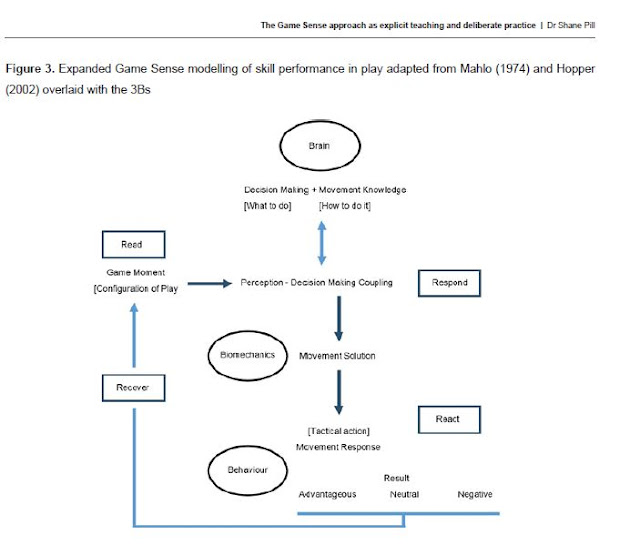Developing game sense coaching by deliberate practice
A game-based coaching approach came to prominence in Australia in the mid-1990s with the advent of the Game Sense coaching approach. The Game Sense approach was a pedagogical response to an over-emphasis on "lines, laps and lectures" that did not prepare players adequately for the complexity of the dynamics of play. In a Game Sense approach, after a warm-up the game or a game-form "becomes the focus and starting-point of practical sessions" (Australian Sports Commission, 1996, p.1).
The Game Sense approach was explained as small sided games coached with an emphasis on the coach asking questions of players in preference to telling. This led to the development of the idea of 'game sense games' that could be used for sport development in any sport within a game category (Game categories = Net/Court, Invasion, Striking/Fielding, Target) in junior game development or 'fundamental' sport skill development (Australian Sports Commission, 1999). This focus continued with the release of the Playing for Life game cards (Australian Sports Commission, 2005).
A Model of Skill Acquisition
A few years ago I attempted to represent a model for skill learning based on the complimentarity of cognition-tactical and action-technical behaviour as the understanding of skilled play to inform a developing game sense using a game-based approach. As game-based approachess focused on developing "thinking players" (den Duyn, 1997), it seemed suitable to outline a 'cognitive' model of skilled performance to the approach, although I have explained in several scholarly papers how well aligned with an ecological dynamic systems perspective a game sense coaching approach like Play with Purpose is (see my Research Gate site for papers https://www.researchgate.net/profile/Shane_Pill). Many GBAs weres developed as a pedagogical models and as such, it is not a surprise that they can be described using more than one theory.
The cognitive model I outlined blends concepts from Mahlo (1974), Hopper (2002), and Patterson and Lee (2013).
There is strong research support for the role of structured and directed instruction (that does not mean reproduction 'do what I tell you' style coaching) in developing the movement learning interaction between actual competence and perceived competence. While a minimally guided 'game as teacher' might be intuitively appealing to some and theoretically justifiable the idea that people learn with greater understanding from personal discovery rather than thoughtful processing is not substantiated. Further, time alone spent in physical activity accumulation is not of itself enough to promote advantageous learning. Displays of competence should not be confused with learning.
This blog is an extract from the paper The Game Sense Approach as Explicit and Deliberate Practice See here for the paper.
The Game Sense approach was explained as small sided games coached with an emphasis on the coach asking questions of players in preference to telling. This led to the development of the idea of 'game sense games' that could be used for sport development in any sport within a game category (Game categories = Net/Court, Invasion, Striking/Fielding, Target) in junior game development or 'fundamental' sport skill development (Australian Sports Commission, 1999). This focus continued with the release of the Playing for Life game cards (Australian Sports Commission, 2005).
The Game Sense coaching idea remained undifferentiated from this small sided game concept across different stages of game development. In the scholarly work I initially did with the Game Sense approach (e.g. see here for the paper: The Game Sense Approach as Explicit and Deliberate Practice) I attempted to show how the tenets of the Game Sense approach - modify games purposefully, ask questions, and deliberately shape play - develop from generic small sided games to purposeful game form practice, 'designer games', and match simulations with experienced players. This led me to the idea of Play with Purpose as I was told my ideas had 'moved beyond' descriptions of the Game Sense approach.
Within the idea of Play with Purpose, I set out how the purpose of the use of games changes when using a game-based approach to develop player game sense as player game development progresses. The image from the 2012 resource Play with Purpose: Developing Game Sense in AFL Footballers, below, shows this sequence and I explain the four stages in a little more detail in this blog here
A Model of Skill Acquisition
A few years ago I attempted to represent a model for skill learning based on the complimentarity of cognition-tactical and action-technical behaviour as the understanding of skilled play to inform a developing game sense using a game-based approach. As game-based approachess focused on developing "thinking players" (den Duyn, 1997), it seemed suitable to outline a 'cognitive' model of skilled performance to the approach, although I have explained in several scholarly papers how well aligned with an ecological dynamic systems perspective a game sense coaching approach like Play with Purpose is (see my Research Gate site for papers https://www.researchgate.net/profile/Shane_Pill). Many GBAs weres developed as a pedagogical models and as such, it is not a surprise that they can be described using more than one theory.
The cognitive model I outlined blends concepts from Mahlo (1974), Hopper (2002), and Patterson and Lee (2013).
This blog is an extract from the paper The Game Sense Approach as Explicit and Deliberate Practice See here for the paper.
Thanks for stopping by and reading this blog. If you would like to connect with the ideas here or any of the ideas I have blogged about, you can contact via my email here





آوا
ReplyDeletethis is aweosome thank you so much for sharing
ReplyDeleteRoyal rumble live